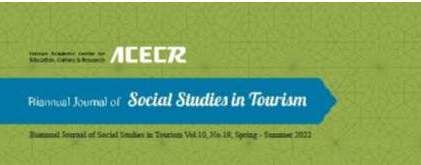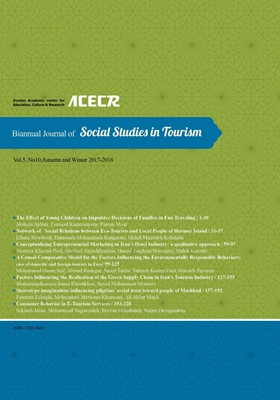Stereotype imaginations influencing pilgrims’ social trust toward people of Mashhad
Subject Areas :fateme eshaghi 1 , Mohammad مظلوم خراسانی 2 * , ali akbar majdi 3
1 - Ferdosi University
2 - دانشگاه فردوسی مشهد
3 - ادبیات و علوم انسانی دکتر شریعتی
Keywords: extended confidence, pilgrims’ stereotype imaginations, ethnocentrism, satisfaction, pilgrims ,
Abstract :
Analyzing and describing “pilgrims’ stereotype imaginations” and “social confidence of pilgrims toward people LIVING in Mashhad” are the two important components in relationships and social interactions of the guest-host. Data were gathered through surveying, using a questionnaire. Statistical population included 310 pilgrims visiting the holy city of Mashhad. The results showed that pilgrims assume the people in Mashhad to be warm, sociable, kind, down to earth, hospitable, patient (positive stereotype imaginations) and to some extent religious and lawful (average or neutral level) and also profit-making, money lovers, stingy and mean, and unfair (negative stereotype imaginations). The level of pilgrims trust toward people in Mashhad was average. Using One-way Variable Analysis and Multiple Regression Methods, to check the hypotheses, showed that pilgrims’ stereotype imaginations had a positive meaningful relationship with the level of social confidence of people in Mashhad, and had the most effect among all measured variables. Other important, effective factors were ethnocentrism, satisfaction, social-economic status, gender, marital status, and ethnicity. Other variables that influenced stereotype imaginations of pilgrims included gender, place of residence, ethnicity, satisfaction, and ethnocentrism.
اسکافی، مریم. (1383). «بررسی ارتباط کسبه، هتل¬داران و رانندگان تاکسی با زائرین امام رضا (ع) و نحوه ارتقاء این ارتباط». جهاد دانشگاهی واحد مشهد.
اشرف نظری، علی. (1392). «رسانه¬ها، تصورات قالبی و روابط بین گروه¬های هویتی». مطالعات فرهنگی و ارتباطات. شماره 52، صص 8-33.
اشرف نظری، علی. (1391). «احساس تعلق هویتی و نقش آن در شکل¬گیری تصورات قالبی در پیش¬داوری: ارزیابی پیمایشی». فصلنامه مطالعات ملی. شماره 49، صص59- 75.
اصغرزاده، مجید. (1383). «فعال¬سازی تصورات قالبی تلویحی به شیوه سرنخ¬دهی». فصلنامه علوم اجتماعی. شماره 27، پاییز 1383. ص 101.
برنز، پیتر.م. (1385). درآمدی بر مردم¬شناسی گردشگری. ترجمه: هاجر هوشمندی. تهران: نشر افکار.
بوني فيس، پريسيلا. (1382). مديريت گردشگري فرهنگي. ترجمه محمود عبداللهزاده. دفتر پژوهش¬هاي فرهنگي.
تاجبخش، کیان. (1384). سرمایه اجتماعی (اعتماد، دموکراسی و توسعه). ترجمة: افشین خاکباز و حسن پویان. تهران: شیرازه.
جیرفتی محمدآباد، عزت. (1385). «میزان اعتماد اجتماعی دانشجویان دانشگاه فردوسی مشهد و عوامل مؤثر بر آن». پایان نامه کارشناسی ارشد، دانشگاه فردوسی مشهد.
حسینی، آمنه. (1391). «بررسی نگرش زنان نسبت به کلیشه¬های جنسیتی و عوامل مؤثر بر آن (مورد مطالعه شهر نیشابور)». پایان¬نامه کارشناسی ارشد. دانشگاه فردوسی مشهد.
حیدر آبادی، ابوالقاسم. (1389). «اعتماد اجتماعي و عوامل اجتماعي - فرهنگي مؤثر بر آن». بازیابی از سایت: www.SID.ir
خبرگزاری ایسنا. (1396): https://www.isna.ir/news/94030603845
خبرگزاری مهر (1396): https://www.mehrnews.com/news/4195903
خوش¬کار، علیرضا. (1387). «بررسی عوامل اجتماعی و فرهنگی مؤثر بر اختلافات کارگری و کارفرمایی در ایران». ماهنامه کار و جامعه. شماره 125-126، صص 81- 92.
زتومکا، پیوتر. (1384). اعتماد یک نظریه جامعه¬شناختی. ترجمه و ناشر: فاطمه گلابی. تبریز:. سایت گردشگری خراسان رضوی: http://www.razavichto.ir
شارع پور، محمود و همکاران. (1389). «بررسی رابطۀ انواع اعتماد با اعتماد اجتماعی در بین دانشجویان دانشگاه مازندران». فصلنامه مطالعات اجتماعي ايران. دوره 4. شماره 3، صص 13-1.
صادقی فسایی، سهیلا و کریمی، شیوا. (1384). «کلیشه¬های جنسیتی سریال¬های تلویزیونی ایرانی». فصلنامه پژوهش زنان. شماره 3، صص 59-89 .
فوکویاما، فرانسیس. (1379). پایان نظم؛ سرمایه اجتماعی و حفظ آن. مترجم: غلامعباس توسلی. تهران: جامعه ایرانیان.
کاظمی، مهدی.(1385). مدیریت گردشگری. تهران: انتشارات سمت.
کتابی، محمود و همکاران. (1389). «سنجش اعتماد اجتماعي و عوامل مؤثر بر آن در مراكز شهرستان¬هاي چهارمحال¬وبختیاری». جامعه¬شناسی کاربردی. صص 122-97.
کلمن، جیمز. (1377). بنیاد نظریه¬های اجتماعی. ترجمه منوچهر صبوری. تهران: نشر نی.
گودیکانست، ویلیام. بی. (1383). پیوند تفاوت¬ها: راهنمای ارتباط کارآمد بین گروهی. ترجمه علی کریمی و مسعود هاشمی. تهران: مؤسسه مطالعات ملی.
گیدنز، آنتونی. (1378). تجدد و تشخص. ترجمه ناصرموفقیان. تهران: نشر نی.
گیدنز، آنتونی. (1384). پیامدهای مدرنیت. مترجم: محسن ثلاثی. تهران: نشر مرکز.
لیپست، مارتین. اس. (1381). جامعهشناسی قشرها و نابرابریهای اجتماعی. ترجمه جواد افشار کهن. نشر نیکا .
مظلوم خراسانی، محمد. (1387). «سنجش میزان رضایت زائرین از مجاورین خدمات¬رسان در شهر مشهد و عوامل مؤثر بر آن». طرح پژوهشی: مرکز پژوهش¬های شورای اسلامی شهر مشهد.
مؤمنی و همکاران. (1387). «ساختار گردشگری مذهبی- فرهنگی و ضرورت مدیریت یکپارچه در کلان¬شهر مشهد». فصلنامه جغرافیا و توسعه. صص 88-65.
نایبی، هوشنگ و عبداللهیان، حمید. (1381). «تبیین قشربندی اجتماعی». نامه علوم اجتماعی. شماره 20، صص 205-236.
هزار جريبي، جعفر و نجفي، ملک محمد. (1389). «اعتماد اجتماعي و توسعه گردشگري». مطالعات و پژوهش¬هاي شهري و منطقه¬اي. شماره هفتم، صص 53-70.
یوسفی، علی. (1388). «اثر سفر زيارتي بر ارتباطات ميان¬فرهنگي اجتماعات شيعی». فصلنامه مطالعات فرهنگي و ارتباطات. سال ششم. شماره 18، صص 115-87.
یوسفی، علی و اصغرپور، احمدرضا. (1388). «قوم¬مداری و اثر آن بر روابط بین¬قومی در ایران». دانشنامه علوم اجتماعی. دوره 1، شماره1، صص 125-144.
Amy, G.& ,spencer,s. (2002) The effect of stereotype threat on women’s performance on the fundantals of Engineering Exam, Virginia tech, university of waterloo.
Bell ,Amyw; Spencer ,Steven (2002) : Stereotype Threat and women's Performance in Engineering ,Journal of Engineering Education .92(4) , 307-312.
Britannica Concise Encyclopedia (2009) ethnocentrism; Encyclopedia Britannica, Inc.
Brownon,Rupert (2002) Prejudice: It’s Social Psychology. Oxford, Blackwell. Casey,Neil. Casey,Bernadette. Calvert,Ben. French,Liam. Lewis,Justin (2002), Television Studies: The Key Concepts, London & New York: Rutledge.
Chatard, Armand. Guimond,Serge. Selimbegovic, Leila (2007), How good are you in math? The effect of gender stereotypes on student’s recollection of their school marks. Journal of Experimental Social Psychology, Volume 43, Issue 6, 1017-1024
Delhey, J., & Newton, K. (2005). Predicting Cross-National Levels of Social Trust: Global Pattern or Nordic Exceptionalism? European sociological review , 21 (4), 311-327.Journal of Experimental Social Psychology, 43: 1017-1024
Janis, Irving L. (1989). Crucial decisions: leadership in policymaking and crisis management. New York: Free Press
Katulis,b. (2004). Women survey: The impact of public Attitudes women’s Rights in the middle Gast and North Africa, Retrieved from: www.socialpsychology.blogfa.com
Kennison S.M,Trof .J.L(2003). Comprehending Pronouns: A Role for word-specific Gender stereotype in formation, Journal of Psycholinguistic Research, vol 32, number 3. 355-378.
Lazar, K., & Staff, G, March (2010), Stereotypes about aging can be bad for your health — or good. Retrieved from: boston.com.
Leal,l. (2003). The essentials of psychology, New Jersey. REA
Newton, Kenneth(2001):Trust, Social Capital, Civil Society, and Democracy ,International Political Science Review ,Vol. 22, No. 2 , 201-214
Pickering, M. (2001) Race ×class stereotype of women. Journal of sex Roles, springer Netherlands ,vol 13,number 1-2. 65-75.
Shayla, C. N.(2009). Racial Homogenization and Stereotypes Black American College Students. Journal of Black Studies, 40(2), 252-262
Yolanda Flores, N.(2005) stereotypes about Chicanas and Chicanos: implications for counseling. Social psychology.112-124.

